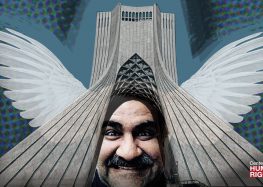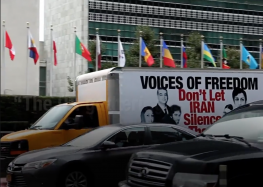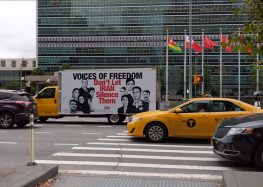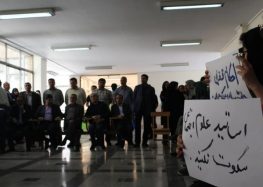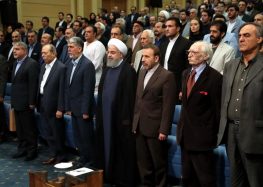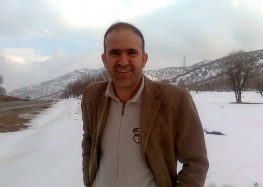Judiciary Chief Accuses Rouhani of Hypocrisy Amid Battle Over Freedom of Expression in Iran
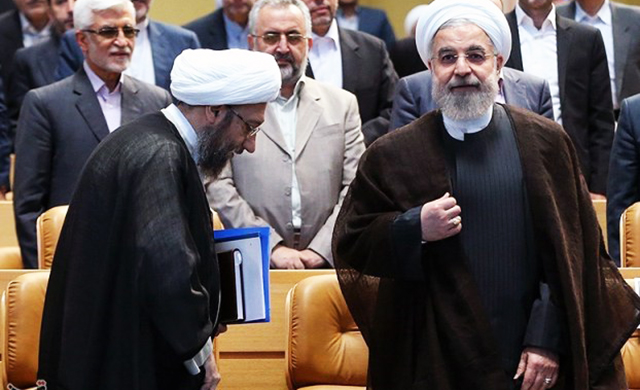
Shortly after criticizing attacks on freedom of expression in Iran, President Hassan Rouhani was accused of hypocrisy by Judiciary Chief Sadegh Larijani, who claimed he had been asked by Rouhani to shut down a newspaper.
Speaking at the opening session of the Tehran Press Exhibition on November 5, 2016, Rouhani said news media can’t serve the public interest if reporters do not feel safe while doing their jobs: “Broken pens and gagged mouths cannot do anything. We must boldly defend responsible freedoms in society. Security is most important for us, but we can’t achieve and preserve it with guns alone.”
Two days later, Larijani chided the president: “My dear brother! You have often asked me in writing and in person, with and without intermediaries, why I haven’t taken action against a certain newspaper. Yet when you talk around reporters you raise your voice in defense of freedom and declare than ‘pens should not broken and mouths should not be gagged.’ Of course, we won’t listen to any of this talk and we will continue on the path of the law,” he said on November 7.
Hours later, Hamid Aboutalebi, one of the president’s top political advisers, fired back on Twitter (which is banned in Iran): “Freedom of expression is different from lies and slander. You cannot claim to be supporting freedom of expression by spreading lies and accusations. The former should be uplifted and the latter should be suppressed.”
Aboutalebi appeared to be referring to the Judiciary’s tolerant attitude towards hardline newspapers that have attacked Rouhani’s policies.
War of Words
Rouhani has criticized the Judiciary’s restrictive stance on freedom of expression on a number of occasions. On April 29, 2014 he said: “All people and groups have the right to criticize, regardless of whether they represent the minority or the majority. What we don’t approve of is when someone takes money from the national treasury and starts a newspaper and then instead of [constructive] criticism proceeds to launch destructive attacks on a government elected by the majority of the people.”
“We want all [members of the press] to clearly identity themselves and their political affiliation,” he added. “They should represent their own faction instead of claiming to speak for the Iranian nation.”
In his sharp rebuke against the president, Larijani did not specify which newspaper Rouhani had allegedly asked him to shut down. However, in 2016 the Judiciary and the Ministry of Culture and Islamic Guidance (the ministers of which are appointed by Rouhani) were publicly at odds over the continued publication of the radical weekly, Ya Lesarat, the official publication of the ultraconservative vigilante group, Ansar-e Hezbollah.
On July 28, 2016 Ya Lesarat published a feature attacking some Iranian actors, alleging that they had “no honor” for allowing their wives to appear in public with allegedly improper hijabs. The piece was titled, Dayyous Keest?” (Who’s a Cuckold?); the Persian word “dayyous” refers to husbands who allow their wives to have intercourse with other men.
In December 2015, Vice President for Women and Family Affairs Shahindokht Mowlaverdi threatened to sue the weekly, which is fiercely loyal to Supreme Leader Ali Khamenei, for describing her as “worse than the most famous prostitute in the world.” Shortly afterwards the weekly’s permit was revoked by the Ministry of Culture and Islamic Guidance’s Press Monitoring Board on January 4, 2016, but it resumed publication two days later because the Judiciary refused to shut it down.
The Judiciary’s leniency towards Ya Lesarat contrasts sharply with the harsh prison sentences it has issued against its critics and independent journalists. The Judiciary’s intolerant stance towards freedom of expression was most recently highlighted by its detention of Yashar Soltani, who has been imprisoned since September 17, 2016 and was charged with “spreading lies” and “gathering classified information with the intent to harm national security” after his news site published an unclassified official document exposing widespread corruption in the Tehran Municipality.
Iran’s Prosecutor General Mohammad Jafar Montazeri later verified the information Soltani had made public by saying in an interview with Iranian state television that the municipality had sold properties “with special discounts above the legal limit” and that some had been allocated to officials located outside the municipality. Montazeri added that the Judiciary had accordingly invalidated the deeds of 36 of the real estate locations in question and the Tehran Municipality had been ordered to cancel excessive discounts.
Defenders of Freedom of Expression
Soltani has received widespread support from the public, including from more than 700 of his colleagues in the media who signed a petition calling for his release. Even outspoken conservative Member of Parliament (MP) Ahmad Tavakkoli criticized the Judiciary’s decision to charge Soltani. “If I were you,” he said on November 7, “I would first look into this list of misappropriated properties before summoning the reporter.”
Parvaneh Salahshouri, the reformist MP from Tehran and leader of the Women’s Faction in Parliament, has also voiced support for Soltani. “Unfortunately, instead of combating the sources of corruption, reporters like Yashar Soltani are being dragged to court for exposing organized corruption in the municipality,” she said in Parliament during an open-session speech on October 25.
Meanwhile the Judiciary has come under unprecedented pressure to review the 16-year prison sentence issued against prominent human rights activist Narges Mohammadi, who will become eligible for release after serving 10 years. On October 16, 2016, 15 MPs sent a letter to Larijani urging the Judiciary to show “Islamic mercy” towards Mohammadi and review her harsh prison sentence.
On November 6 Montazeri was presented with another letter signed by 17 MPs asking him to explain the reasoning behind Mohammadi’s harsh sentence. “We are again seeking a review of Mohammadi’s case,” said the letter. “We do not believe her actions were all correct, but we do know that these kinds of actions by individuals cannot bring any harm upon the Islamic Republic.”
“Sometimes criticism can be viewed as ‘propaganda against the state,’ or a reformist undertaking by a group can be interpreted as an ‘act against national security’ and those involved are sentenced to years in prison without taking into account the impact of the actions by the accused and the punishment against them… consequently, these heavy handed verdicts against social and political activists usually have the reverse effect,” said the letter.
The MPs who signed the letter were: Alireza Rahimi, Vali Dadashi, Mohammad Javad Fathi, Ghasem Mirzaie, Amir Khojasteh, Fatemeh Zolghadr, Ali Motahhari, Mahmoud Sadeghi, Gholamreza Heydari, Tayebeh Siavoshi, Farideh Oladghobad, Ardeshir Nourian, Abdolkarim Hosseinzadeh, Fatemeh Saeedi, Bahram Parsaie, Mohammad Reza Tabesh, and Gholamreza Tajgardoun.
In response, Montazeri dismissed the first request from the MPs and accused Mohammadi of being part of a foreign plot designed to undermine the Islamic Republic.
“Today the enemy is seeking to weaken the identity and besmear the Islamic state, and the supreme leader of the revolution has warned all people and officials not to be deceived by the enemy,” he said at an event honoring the “3,000 martyrs in North Khorasan Province” who died in the Iran-Iraq War (1980-88). “The JCPOA (Joint Comprehensive Plan of Action, 2015) is one side of the triangle. Another side consists of so-called defenders of human rights based abroad who direct their trained agents inside the country. And the third side of the triangle is made up of officials who unknowingly do things based on ignorance.”

